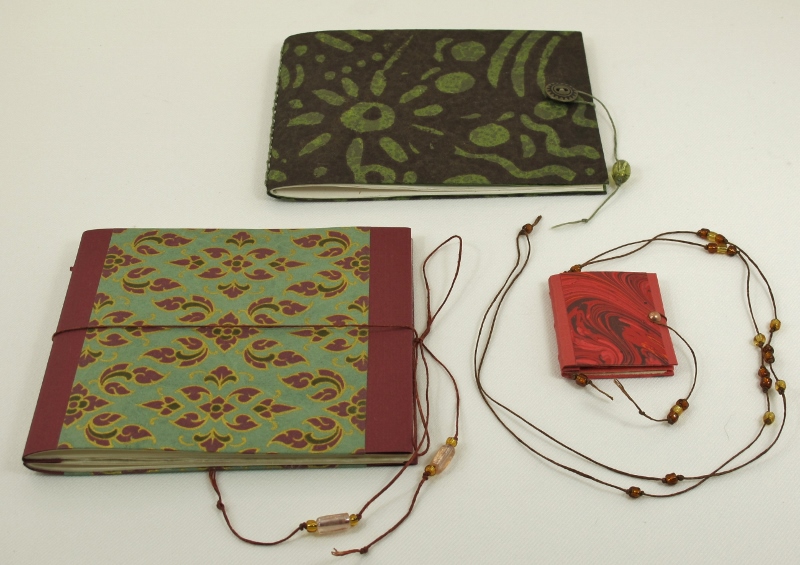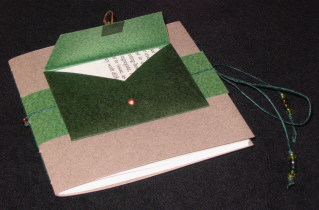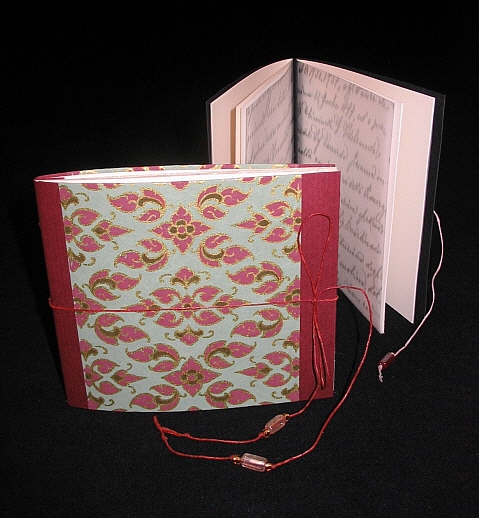Letters, words, phrases, pages of text . . . some variants of these ways to shape meaning inevitably find their way into my artist’s books. Even when I create books that contain only a word or two, the text has some vital connection to the imagery and to my overall expressive intent. I’m haunted, therefore, by the fact that approximately 20% of adults (one in five) in the United States are functionally illiterate. Reading at or below the fifth-grade level, these adults face difficulties with everything from reading prescription labels to applying for jobs to reading with their children.
Like many other artists, I am eager to help address these dire needs by supporting the countless adults determined to read and the literacy programs committed to serving them. Various literacy programs for children have already recognized the empowering, multifaceted value of making books by hand, especially since this process allows for creative variations in size, shape, and materials. I firmly believe that adults who are learning to read also can gain fresh, revelatory language experiences as they create unique containers for words—whether those are single words with special meaning for them, accounts of their own life experiences, or text they’re exploring in a literacy program.
I firmly believe that adults who are learning to read also can gain fresh, revelatory language experiences as they create unique containers for words—whether those are single words with special meaning for them, accounts of their own life experiences, or text they’re exploring in a literacy program.
I’m eager to share ideas with others about how book arts can support literacy efforts. In considering the possibilities, I draw on my book-arts teaching experiences and knowledge gained through the A+ Schools program, as well as an academic background that includes a B.A. in English and an M.S. and a Ph.D. in human development and family studies.
As a lifelong learner, I look forward to learning from your perspectives, too.

Here are some valuable literacy resources, including approaches that integrate book arts and some book arts guides easily applied in various settings and with different age groups:

Better World Books [This online bookselling organization has the specific purpose of supporting worldwide literacy programs.]
Cherryl Moote, books on bookmaking [She is one of many talented book artists with excellent guides to bookmaking. Her books contain specific directions that may be especially helpful to literacy tutors or others wanting to teach bookmaking to adult learners.]
Comic Book Project, Center for Educational Pathways
Mary Jeanne Linford, Making Amazing Books with Pop-up and Moveable Pages [Linford provides clear instructions, excellent templates for classroom use, and a wealth of ideas based on her book-creating experiences with more than 6,000 sixth-grade students.]
New York Times, “Guggenheim Study Suggests Arts Education Benefits Literacy Skills”
North Carolina Reading Association
Paul Johnson, Literacy through the Book Arts and A Book of One’s Own: Developing Literacy through Making Books [Johnson is a leader in using bookmaking to promote children’s literacy.]
Susan Kapuscinsky Gaylord, Making Books with Children [A gifted and generous book artist, calligrapher, and teacher, Gaylord offers many excellent bookmaking resources in addition to this guide.]
This I Believe radio essays, National Public Radio: Chameli Waiba, “The Magic of Letters”; Daniel Flanagan, “The Choice to Do It Over Again”; and Judith [?], “I Know Why I’m Here”
Wallace Foundation, The Knowledge Center
The following poems are dedicated to all adults who are learning to read, whether English is their primary or their secondary language:

Taking the Steps
Been faking it
for forty-five years.
Got good at hiding
and pretending and
leaving the room
at just the right time.
Looked for shapes and lines
and colors I could say I knew.
But only I knew
what I had struggled
to learn, what had pounded
through my dreams and
made my pulse race
when I feared being caught.
Was caught, a few times–
was called stupid, slow.
I’ve cried and prayed
and lost enough sleep
for a thousand nighttimes.
Guess this is all I can do,
what I’m doing right now:
pushing the door open,
walking in, saying
I want to learn to read,
telling myself I can.
“Taking the Steps” first appeared in Award-Winning Poems, North Carolina Poetry Society.
Everyday Transformations
I came seeking a country
to love and now long
for a smile from any
one of those I see
each day, those who
never try to say my name.
Daytime: lifting their children,
scrubbing, ironing, cooking,
watching people laugh
at my awkward tongue.
Nighttime: lifting my children,
scrubbing, ironing, cooking,
repeating taped phrases
until I fall asleep.
No one knows that before this
I stitched wounds and read daily,
saved money for seventeen years.
But I came with no experience as
an outcast amid plenty.
Were I to dwell on yesterday’s
dreams, I would go mad.
At least now my children
speak two languages and belong
in this place I hope to call home.
“Everyday Transformations” appears in the chapbook Personal Effects (Carthage, NC: Scots Plaid Press, 1998).
